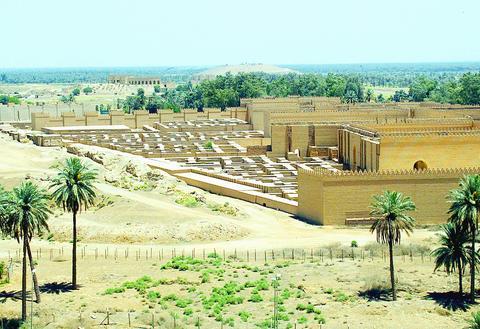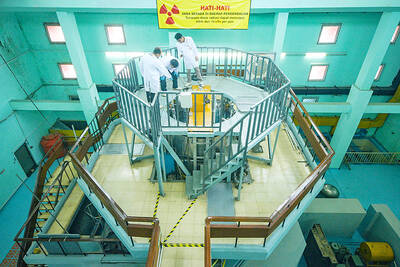This 4,300-year-old town -- now mainly an archaeological ruin with two important museums -- knows political and military upheaval well. Dynasties have risen and have fallen here since the earliest days of settled human civilization.
King Hammurabi wrote his famous code of laws here.

PHOTO: AP
Nebuchadnezzar sent his vast army from here to Jerusalem to put down an uprising and bring the Jews back as slaves.
Some say Alexander the Great, who lead his great army out of Macedonia to conquer most of the known world, died here in 332 BC.
The American military is just the latest to pass through the Euphrates River city. And now US soldiers and civilian occupation officials struggle with mixed success to put the city -- with its deep resonance in so many important cultures -- back together yet again.
The newest of the conquerors who have washed through the fertile crescent for millennia have held the site of the Hanging Gardens -- one of the seven wonders of the ancient world -- for a mere 3 1/2 months.
The Americans are cleaning up after mobs of looters ransacked the city's two museums, but fortunately got away mainly with small display copies of ancient artifacts. Museum managers, fearing looting as the US-led coalition threatened war, bricked up the museum windows.
The looters, however, yanked air conditioners out walls and climbed in and out of the holes carting off the display copies of humankind's earliest handiwork. Most of the real artifacts were stored in vaults at the Iraq Museum in Baghdad, which also was looted. It is not known what portion of the stored Babylonian museum treasures have been lost.
Fortunately the makeshift holes were too small for looters to escape with the large pieces in the city's two museums, named after Hammurabi and Nebuchadnezzar.
Nearly two weeks after Saddam Hussein fell on April 9, US Marines entered Babylon to find dozens of vendors had flooded into the streets as looters robbed the museums, souvenir shops, a restaurant and the police station. US troops said they moved swiftly to stop the lawlessness.
``On my first day here, I caught many people. ... We had to arrest few looters at that time,'' said US Navy Chaplain Commander Emilio Marrero, project official of the site. ``[We] pushed everybody outside the gate so that we could preserve the city.''
Since then Babylon has been closed to the public, but Marines hope to reopen the site within two months, Marrero said. The Marines have created a major base at the city, calling it Camp Babylon.
``We took over the compound because of the need that we saw here in the ruins and in the museums and the surrounding area,'' he said.
Decoys
Mariam Omran, director of Babylon's two museums, said they were both looted but ``most of the pieces in the museums were certified copies not real relics. All the display cases were damaged as was a miniature model of the old city.''
Marrero said only three actual relics were displayed in the Nebuchadnezzar museum. They disappeared with all the display copies. He said the Americans were trying to recover the pieces and had found some.
``Most of the relics that belong to this place are up at the museum of Baghdad and they've been up there since 1989,'' he said.
The first people to settle and build in Babylon were the Akkadians, who called the city Akkad. King Sargon I was the founder of the dynasty that lasted just two centuries.
``So many things were looted. The whole antiquities department, the library -- full of historical books, and the city's ancient archive -- were stolen then burned. Why did they burn it?'' asked Omran while standing in one of Nebuchadnezzar Museum's four large rooms where workers were busy painting the walls and fixing the miniature model of Babylon.
The Coalition Provisional Authority, headed by L. Paul Bremer, is spending thousands of dollars to renovate and repair the damage.
So far, the coalition has invested US$60,000 and plans to spend about that much more, Marrero said.
``The first phase of reconstruction was to insure that the museum was protected so we installed an alarm system in the museum. We repainted it, repaired it, fixed the roof ... cleaned it up after the looters,'' he said.
The souvenir shop, a small ticket office and the police station were repaired as well.
More than two decades of war, UN sanctions and international ostracism of the Saddam regime nearly killed tourism to Iraq's unparalleled archaeological sites.
Yet the nonpaying tourists -- more than 10,600 US Marines, sailors, soldiers, aid workers and journalists -- have passed through ancient Babylon since April 26, Marrero said.
Those who visit the ruin in the years to come will be reading the name of Saddam, stamped into the bricks used in reconstructing Nebuchadnezzer's Southern Palace, the seat of the king's ancient empire.
When reconstruction began, the palace walls had crumbled to a fourth of their original height. On Saddam's orders the walls were reconstructed between 1982 and 1987.
Bricks that brag
Some of the mud bricks in the original wall carried the seal of Nebuchadnezzar. The bricks used in the Saddam reconstruction, not to be outdone by the likes of the ancient king, read:
``The City of Babylon was reconstructed during the era of the victorious Saddam Hussein, President of the Republic, protector of the great Iraq, the modernizer of its renaissance and builder of its civilization.''
The Marines are getting ready to leave the area soon and will hand security over to Polish troops, Marrero said. But until then US troops are enjoying the site.
``I think its pretty cool. I mean, I used to watch the discovery channel but never thought I'll actually be where they are. It's kind of cool. I enjoy it,'' Marine Lance Corporal Rod Brooks of Chicago, said as he looked at the 2,600 year-old Lion of Babylon, symbol of Babylon's strength against invaders.

Four people jailed in the landmark Hong Kong national security trial of "47 democrats" accused of conspiracy to commit subversion were freed today after more than four years behind bars, the second group to be released in a month. Among those freed was long-time political and LGBTQ activist Jimmy Sham (岑子杰), who also led one of Hong Kong’s largest pro-democracy groups, the Civil Human Rights Front, which disbanded in 2021. "Let me spend some time with my family," Sham said after arriving at his home in the Kowloon district of Jordan. "I don’t know how to plan ahead because, to me, it feels

Poland is set to hold a presidential runoff election today between two candidates offering starkly different visions for the country’s future. The winner would succeed Polish President Andrzej Duda, a conservative who is finishing his second and final term. The outcome would determine whether Poland embraces a nationalist populist trajectory or pivots more fully toward liberal, pro-European policies. An exit poll by Ipsos would be released when polls close today at 9pm local time, with a margin of error of plus or minus 2 percentage points. Final results are expected tomorrow. Whoever wins can be expected to either help or hinder the

North Korea has detained another official over last week’s failed launch of a warship, which damaged the naval destroyer, state media reported yesterday. Pyongyang announced “a serious accident” at Wednesday last week’s launch ceremony, which crushed sections of the bottom of the new destroyer. North Korean leader Kim Jong-un called the mishap a “criminal act caused by absolute carelessness.” Ri Hyong-son, vice department director of the Munitions Industry Department of the Party Central Committee, was summoned and detained on Sunday, the Korean Central News Agency (KCNA) reported. He was “greatly responsible for the occurrence of the serious accident,” it said. Ri is the fourth person

SKEPTICAL: Given the challenges, which include waste disposal and potential domestic opposition, experts warn that the 2032 nuclear timeline is overambitious Indonesia is hoping going nuclear can help it meet soaring energy demand while taming emissions, but faces serious challenges to its goal of a first small modular reactor by 2032. Its first experiment with nuclear energy dates to February 1965, when then-Indonesian president Sukarno inaugurated a test reactor. Sixty years later, Southeast Asia’s largest economy has three research reactors, but no nuclear power plants for electricity. Abundant reserves of polluting coal have so far met the enormous archipelago’s energy needs, but “nuclear will be necessary to constrain the rise of and eventually reduce emissions,” said Philip Andrews-Speed, a senior research fellow at the